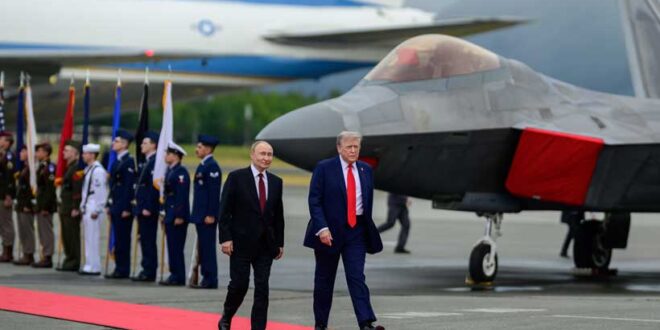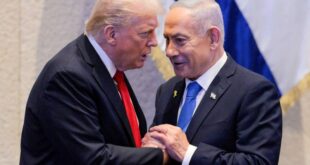Fakhar Alam
The protracted Ukraine crisis has, at one point, created severe challenges for the global security architecture; on the other hand, it has caused unprecedented damage to the nuclear Non-Proliferation Regime (NPR). Prominently, this crisis has reinforced the perception among non-nuclear-weapon states (NNWS) that possessing nuclear weapons is the only reliable means of ensuring ultimate national security. This crisis has led to the failure to achieve consensus at the NPT Review Conference (RevCon) 2022. Simultaneously, during these three and a half years of continuous fighting over Ukraine, the safety and security of nuclear power plants (NPPs) in the conflict zone were undermined many times. Likewise, the only intact bilateral arms control treaty between the United States (US) and Russia, the New Strategic Arms Reduction Treaty (START), has been put on hold due to this crisis. However, President Trump and President Putin are again going to meet in Budapest for peace talks over Ukraine. During their August Alaska summit, both heads of state pledged to extract a comprehensive peace deal instead of a temporary ceasefire agreement. The following article explores what if President Trump and President Putin succeed in extracting a comprehensive peace deal over Ukraine, how it will affect the NPR.
First and foremost, the Ukraine crisis has recalibrated the importance of indigenous nuclear weapons capability and undermined the credibility of Negative Security Assurances (NSA). In 1994, under the Budapest Memorandum, Russia, along with the US and the United Kingdom (UK), committed through a political assurance that they would not use or threaten to use force against Ukraine, including the non-use of nuclear weapons. In exchange, Ukraine acceded NPT as an NNWS and relinquished the nuclear weapons that it inherited from the Soviet Union. However, the Russian invasion of Ukraine and repeated threats of using nuclear weapons against Ukraine have shattered the credibility of the assurances. Moreover, the Ukraine crisis has led to a debate about what if Ukraine had an indigenous nuclear weapons capability, could Russia have thought of invading it? Right after the attack, countries like South Korea openly started considering an indigenous nuclear weapons capability for ultimate security. Therefore, if a peace deal is inked backed by credible security guarantees for Ukraine, it could restore some faith in assurances given by nuclear weapons states (NWS) to NNWS; however, the Ukraine precedent has already weakened the normative power of NSA as a nonproliferation tool, compelling NNWS to question whether political assurance alone can substitute nuclear deterrence.
Simultaneously, during these more than three and a half years of the Ukraine crisis, the security and safety of NPPs situated in or near the conflict zone were alarmingly undermined more than 15 times. Some of these attacks even resulted in the shutdown of the cooling systems of NPPs, thereby risking a major nuclear catastrophe. Particularly, the Zaporizhzhia power plant alone has faced six major incidents, including heavy shelling and drone strikes, highlighting the vulnerability of civilian nuclear infrastructure in wartime. And the threat of another major attack on any of the NPP situated in or near to conflict zone is still there. However, a peace deal with explicit conditions for the safety and security of NPP will not only stop direct attacks on the power plants; it will improve the currently deteriorated situation of such plants, in which the International Atomic Energy Agency (IAEA) representatives and nuclear scientists are working. At the same time, under the peace deal, the mutually agreed-upon conditions regarding the safety and security of NPP in or near the conflict zone would hold a normative value for the rest of the world and could assist in avoiding such a situation in future crisis.
Similarly, the 2022 NPT RevCon failed to achieve a consensus because Russia blocked the final document, which raised serious concerns regarding the safety and security of NPP in the conflict zone. The final document produced after consensus at the NPT RevCon holds political and normative weight as it reflects the unanimous consensus of NPT signatory states regarding the future steps to strengthen the NPT. Now, the next RevCon is scheduled for 2026. If the US and Russia are successful in having a comprehensive peace deal, then it would increase the probability of having a consensus in RevCon 2026, because one of the reasons that led to the failure in achieving consensus in earlier RevCon would not be there.
Furthermore, US-Russia relations and, particularly, bilateral arms control have been severely impactedby the situation in Ukraine. Right after this crisis erupted, the New START, the only intact arms control agreement between the US and Russia, was suspended. So far, both sides are claiming that they are adhering to the promised treaty limits. However, neither side is allowing verification inspection while both sides are claiming the other side is not adhering to the treaty’s limit. Thus, the threat of a renewed arms race between the US and Russia looms there. Moreover, this treaty is also set to expire in 2026, thereby raising further concerns regarding the future of US-Russia arms control. A peace deal, therefore, will not only improve the US-Russia relations; instead, this would provide an opportunity for the Cold War rivals to work on bilateral arms control.
Moreover, the threat of renewed nuclear weapons testing has also grown during the Ukraine crisis. Russia’s withdrawal from the ratification of the Comprehensive Nuclear-Test-Ban Treaty (CTBT), coupled with debates in the US over the future of its own testing moratorium, has heightened uncertainty. If the current situation prevails and any state, either the US or Russia, goes for nuclear testing, the other will also follow suit. And this situation will provide a window of opportunity for other nuclear-weapon states, which are eagerly waiting for nuclear weapons testing to validate their advanced systems and new designs. This might even result in a chain reaction of nuclear testing around the globe. Therefore, if a peace deal is inked, it could preserve the global norm against nuclear weapons testing.
So far, all the objectives of the NPR, including preventing the spread of nuclear weapons through different barging tools, assisting NNWS in peaceful nuclear activities, elevating safety and security standards of NPPs, establishing a norm against nuclear weapons testing and promoting arms control, have been unprecedentedly challenged during the Ukraine crisis. Therefore, if the US and Russia are successful at devising an inclusive and comprehensive peace agreement, the further deterioration of the NPR could be avoided.
Author’s Bio:
Mr Fakhar Alam is a Research Officer at the Center for International Strategic Studies (CISS), Islamabad. He was a CTBTO-CENESS Research Fellow for the year 2023. Fakhar writes on matters related to National Security and Nuclear diplomacy.
 Geostrategic Media Political Commentary, Analysis, Security, Defense
Geostrategic Media Political Commentary, Analysis, Security, Defense





